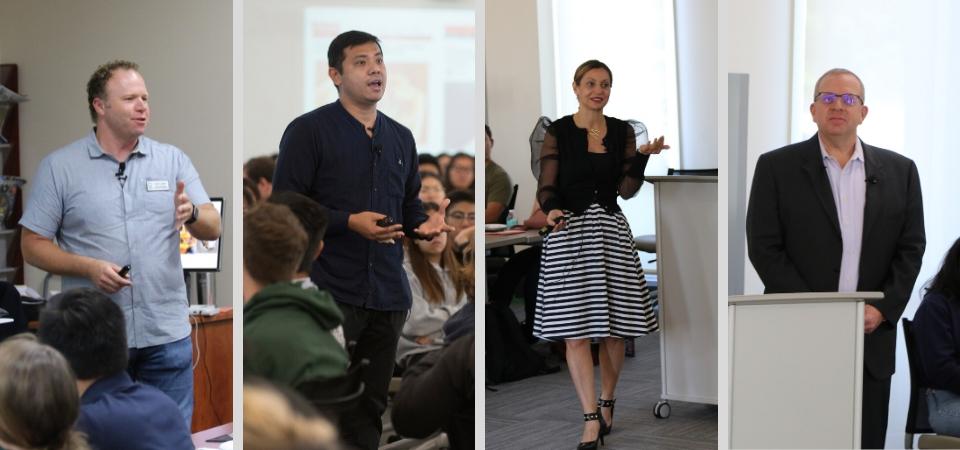2019 Hospitality Innovation Speaker Series
Slideshow
This slideshow contains 1 slides that will change every 8 seconds. The first button is to play and pause the slideshow, followed by buttons to go to the previous slide, next slide, or choose individual slides.

The hospitality industry is always evolving thanks to innovative technologies and ideas. Throughout the 2019 fall semester, The Collins College of Hospitality Management welcomed industry professionals to speak to students for the fourth annual Hospitality Innovation Speaker Series about the importance of identifying innovative solutions to push the industry forward. The speaker series featured professionals from an array of companies that conduct business in the hospitality industry. Each speaker gave students real-world examples of how innovation had a positive impact on their respective companies.
The first installment of the Hospitality Innovation Speaker Series featured Chris Simms, CEO and founder of The Lazy Dog Restaurant & Bar. In his early career, Simms worked with P.F. Chang’s China Bistro, and then with Mimi’s Café, the restaurant company founded by his grandfather, Arthur J. Simms, and father, Tom Simms. When Simms opened the first Lazy Dog restaurant, he sought innovative ways to improve the guest experience at casual dining restaurants and incorporated his love for the Rocky Mountains.
“People today want to experience new things because they quickly get tired of things,” Simms said. “As a company, you have got to stay on the cutting edge and offer new things to your guests, or they will get bored.”
With standing room only, Simms emphasized, “transparency and authenticity are important because guests today are skeptical and hold search engines in their hands. At Lazy Dog, we communicate that through the menu because it's the first thing that they touch when they sit down in the restaurant.”
The speaker series enhances the learning of hospitality principles, especially in the area of innovation, for Collins College students.
“I enjoyed Chris Simms because he explained to us about the warmth of his restaurant chains and the process behind the planning, building and development of his restaurants,” said Chin Phan, an international HRT student. “I like when he shared that when we dine at the restaurant, we will enjoy classic family meals while experiencing a Rocky Mountains atmosphere.”
Students filled The Collins College’s largest lecture room for a presentation from Chef Jimmy Wang, director of product development at Panda Restaurant Group. Chef Wang leads the vision and growth of culinary innovation at Panda Express and oversees the team responsible for creating and implementing recipes and dishes for new menu items, limited-time offerings and core product improvements as well as cook training across more than 2,100 Panda Express restaurants around the world.
“We study national and global trends to create the next version of Panda Express,” Wang said. “It’s not enough to work on what we've been good at. We have to look at what's going to happen in the future, to stay relevant.”
Combining his Asian heritage, classic French training, and passion for food, Wang uses his global culinary perspective to redefine and elevate American Chinese cuisine.
“Sometimes innovation isn't about rocking the boat, but more of an evolution,” Wang said. “When I joined the company, I thought about the way we serve our food. Our meals require you to sit down and lack mobility. So, we wanted to make our food handheld. That’s when we created the first version of the orange chicken burrito.”
Students heard a dynamic lecture from Maisie Ganzler, chief strategy and brand officer at Bon Appetit Management Company. Ganzler has more than 25 years of experience in socially and environmentally responsible purchasing at Bon Appétit Management Company, where she has been instrumental in shaping the overall strategic direction of this food service pioneer.
“Don’t look before you leap,” Ganzler said. “You're not going to have all the information you need to make a decision, and if you wait, someone else is going to move before you.”
Ganzler helped develop the Farm to Fork program, a groundbreaking company-wide initiative to buy locally, and has since helped create and launch Bon Appétit’s progressive initiatives. Most recently, she has focused on slavery and antibiotics used in the seafood supply chain and on the company’s investment in a more plant-forward future.
To create innovations, Ganzler pointed out the importance of understanding a company and its values. “Bon Appetit is a company with a dream,” Ganzler said. “I think you have to know who you are to decide where you innovate from and that innovation stays in line with fundamentally who you are as a company.”
The last guest lecturer of the Hospitality Innovation Speaker Series was Daniel Harley, the director of strategic accounts for Tanium. Harley's day-to-day work involves cybersecurity applications for major corporations in the hospitality industry. In addition, Harley provides POS & back-of-the-house solutions to hospitality and retail customers. Harley is also a Collins College Board of Advisors member and shared tips on professional development with students.
Harley educated students on cybersecurity and how it is necessary to move forward with innovation. “It seems simple, but you would be surprised from an enterprise point of view how little is done for cybersecurity, and that creates a lot of opportunity for hackers.”
According to Harley, you have to secure your company’s assets and presence before you can proceed with shaping the future. The college felt that Harley’s experiences with cybersecurity would be informative to aspiring professionals in attendance.
“Cybersecurity shows how broad hospitality can range,” said Justin Shin, a Collins Student Ambassador. “I also resonated with Harley talking about always being a student. No matter what age we are, we should be proactively learning new ideas and gain new perspectives of the world.”
For more than 45 years, The Collins College of Hospitality Management has been dedicated to advancing the hospitality industry. With our collaborative learn-by-doing approach, our profound appreciation of diversity, and strategic integration of scholarship, service, and applied learning, the college is a preeminent source of future leaders in the hospitality industry.

